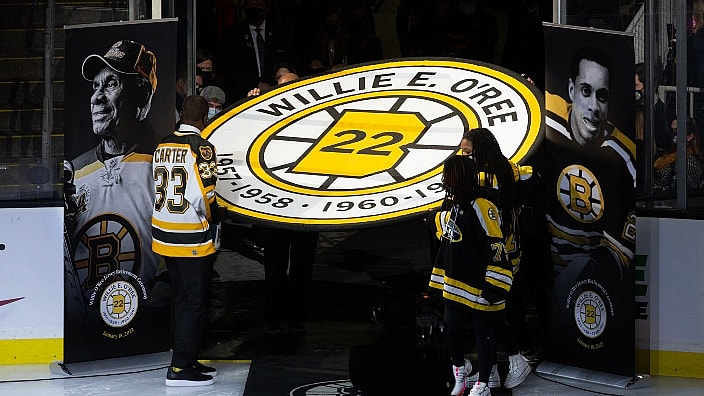The nation’s highest civilian award will soon be bestowed upon Willie O’Ree, the first Black man to play in the National Hockey League.
The Congressional Gold Medal is awarded via an act voted in Congress, and the measure honoring O’Ree was introduced by Democratic Michigan Sen. Debbie Stabenow and Republican South Carolina Sen. Tim Scott, an effort in bipartisanship. It unanimously passed the Senate in July, and unanimously passed in the House of Representatives this week.

The Willie O’Ree Congressional Gold Medal Act will now progress to the desk of President Joe Biden for his signature.
O’Ree has been called “The Jackie Robinson of Hockey.” He played his first game in the NHL with the Boston Bruins on Jan. 18, 1958. His number was retired by the team Tuesday night, the 64-year anniversary of that history-making achievement.

According to CNN, O’Ree went on to play 45 games with the Bruins, and played professional hockey for 21 years. Additionally, he inspired young people by building more than 30 nonprofit youth hockey programs and giving over 130,000 children the chance to play hockey. As of March 2020, 97% of the NHL was white, while 3% comprise other ethnicities.
“Receiving the Congressional Gold Medal is simply one of the greatest honors of my life,” O’Ree said in a statement Wednesday, per NBC Sports. “There are no words to describe how special the last few days have been, with the Boston Bruins retiring my number and U.S. Congress voting for this amazing recognition. I will always be humbled and grateful to be a recipient of the Congressional Gold Medal, and I am especially thankful to everyone who worked so hard to make this moment happen.”
O’Ree was called up from the minor league in 1958, and would not have been put on the team if the Bruins had known that he was rendered blind in one eye, hit by an errant puck two years earlier. “Besides being Black and being blind in my right eye, I was faced with four other things: racism, prejudice, bigotry, and ignorance,” he told CNN.
“As the sole black player in the NHL at the time, Willie endured relentless bigotry, racism, discrimination and even violence from fans and players, both on and off the ice,” said Massachusetts Rep. Ayanna Pressley, one of the bill’s main sponsors, before the House voted, according to NBC. “Despite it all, Willie embodied resilience, grace, dignity and never gave up on the determination to live out his dream.”
O’Ree’s jersey — Number 22 — was retired in a ceremony held at Boston’s TD Garden in which Anson Carter, the Canadian former Bruins player, participated. O’Ree took part virtually from the California home of his daughter amid concerns related to COVID-19.
Have you subscribed to the Grio podcasts “Dear Culture” or “Acting Up?” Download our newest episodes now!
TheGrio is now on Apple TV, Amazon Fire, and Roku. Download theGrio today!

